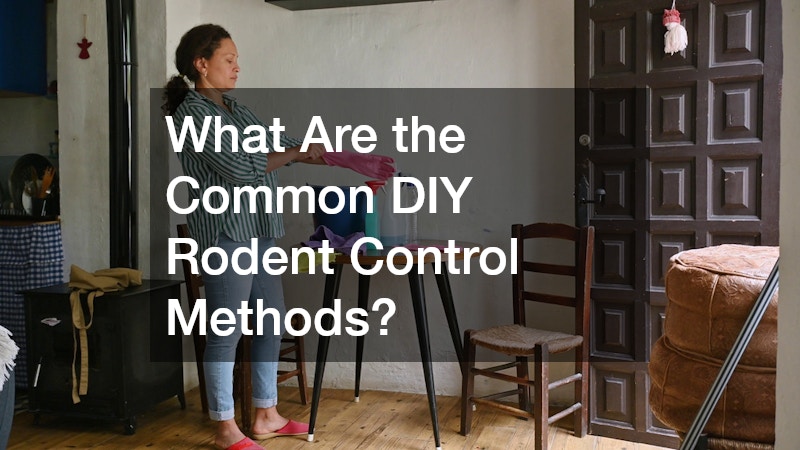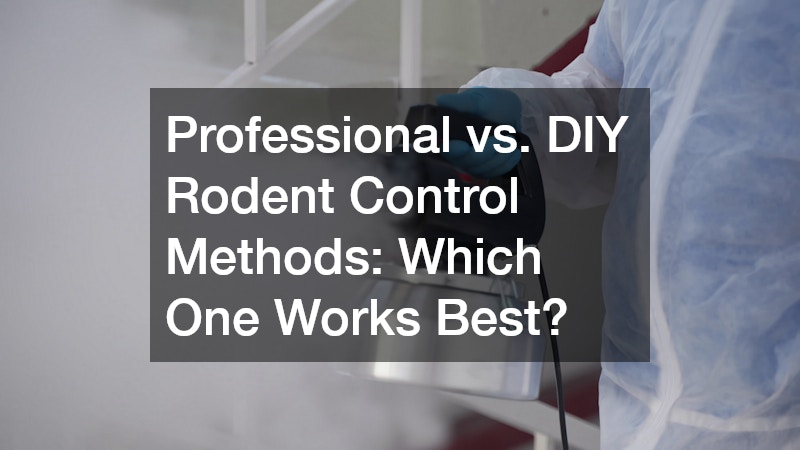Rodents are more than a nuisance—they’re a threat to your home, health, and peace of mind. Whether you’re dealing with rats, mice, or other gnawing intruders, you may be wondering if a do-it-yourself (DIY) approach will solve the problem or if it’s time to call in the professionals.
This article explores the pros and cons of both professional and DIY rodent control methods, helping homeowners decide which route is most effective for long-term results.
What Makes Rodent Infestations So Challenging?
Rodents are quick breeders and skilled escape artists. A single pair of mice can produce dozens of offspring in just a few months. They sneak into homes through tiny cracks and survive on minimal food, often making their nests behind walls, under floors, or in attics. Left unchecked, an infestation can grow rapidly, leading to structural damage and health hazards such as the spread of hantavirus, leptospirosis, and salmonella. Because of these dangers, understanding your control options is crucial. But should you take matters into your own hands or bring in the experts?
What Are the Common DIY Rodent Control Methods?

For homeowners who prefer hands-on solutions, there are several DIY approaches worth trying. Most are affordable and readily available at local hardware stores.
Popular DIY Rodent Control Tools:
- Snap traps: A quick and effective method, but requires proper placement and regular monitoring.
- Glue boards: Useful for small spaces, though considered inhumane by some.
- Ultrasonic repellents: Emit sound waves that are unpleasant to rodents, though their long-term effectiveness is debatable.
- Rodenticides (poison baits): Can reduce populations but pose risks to children, pets, and non-target animals.
- Natural deterrents: Peppermint oil, ammonia, or vinegar sprays may help discourage entry.
Benefits of DIY methods:
- Cost-effective
- Immediate availability
- Offers a sense of control
Drawbacks:
- Often only provide short-term relief
- Risk of incomplete elimination
- May result in hidden dead rodents and unpleasant odors
DIY rodent control methods can work if the infestation is small and caught early, but they may not be enough for persistent or widespread problems.
What Can Professional Rodent Control Services Offer?
Professional pest control companies provide comprehensive solutions designed for lasting results. Their expertise goes beyond basic trapping.
Key Services Offered by Professionals:
- Inspection and assessment: Identifying entry points, nesting areas, and food sources.
- Customized treatment plans: Combining traps, baits, and environmental controls tailored to your situation.
- Exclusion techniques: Sealing cracks, vents, and other entry points to prevent reinfestation.
- Follow-up monitoring: Ensuring that the infestation is truly resolved.
Benefits of Hiring a Pro:
- Trained technicians with experience
- Use of commercial-grade products not available to consumers
- Focus on long-term prevention
- Safer handling of poisons and traps
Potential Downsides:
- Higher upfront cost
- Requires scheduling appointments
- Some homeowners may prefer not to use chemicals
Professional rodent control is especially recommended for large infestations, repeated problems, or when rodents pose a serious health risk.
Cost Comparison: Is DIY More Budget-Friendly in the Long Run?
At first glance, DIY rodent control seems like the more affordable option. Snap traps and repellents cost just a few dollars, while poisons are generally inexpensive. However, repeated purchases and limited success can add up over time.
Professional services typically charge $150–$500 per visit, depending on the severity of the infestation and the size of your home. While this may seem costly, professionals can often resolve the issue more effectively and reduce the chance of recurrence, potentially saving you money on future repairs and treatments.
Hidden costs of DIY:
- Replacing chewed wires or insulation
- Property damage from nesting
- Medical bills from rodent-borne illnesses
When evaluating cost, consider both immediate expenses and long-term value.
Which Approach Works Best for Your Home?

There is no one-size-fits-all answer. Your decision should be based on the size of the infestation, your budget, and your comfort level with pest control tasks.
Choose DIY if:
- The infestation is small and localized
- You want a cost-effective, hands-on solution
- You’re comfortable monitoring and resetting traps
Choose a Professional if:
- The infestation is widespread or recurring
- You want fast and long-lasting results
- You’re concerned about health risks or structural damage
Some homeowners start with DIY methods and escalate to professional help if the problem persists. Others prefer to skip trial-and-error and go straight to the experts for peace of mind.
Final Thoughts: Combining Rodent Control Methods for Best Results
In many cases, the most effective strategy is a hybrid approach. You can start with DIY traps and deterrents while also sealing up entry points and keeping your home clean. If the infestation doesn’t improve, call a professional before it worsens.
Ultimately, knowing your limits is key. While DIY methods offer convenience and affordability, professionals bring expertise and lasting results. By weighing the pros and cons of each method, homeowners can make a confident, informed decision that protects their home and health.

